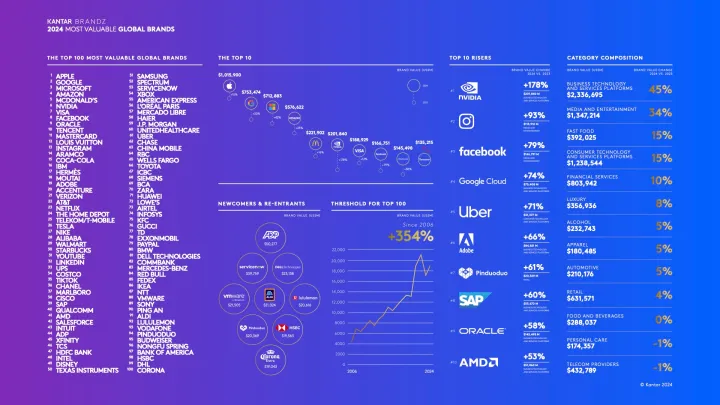
While many would assume otherwise, a recent report tells us that AMD is now a more recognizable brand than Intel — and that’s big news for the tech giant. Kantar’s BrandZ Most Valuable Brands report ranks AMD at 41, followed by Intel at number 48. Beating its long-standing rival is just one part of the prize for AMD. It also ranked among the top 10 risers in the report, meaning that its brand value increased a lot over the last year.
According to the report, AMD saw massive brand growth since 2023, increasing by 53% year-over-year. Moreover, AMD’s brand value reached $51.86 million in the Business Technology and Services Platforms category. It’s easy to guess where that intense growth is coming from — AMD is leaning into AI, just like its rivals Intel and Nvidia have done in recent years.
Kantar’s report takes into account a company’s financial value and then multiplies it by its brand contribution to find out its total brand value. To put it in simpler terms, Kantar weighed in on how much AMD’s brand contributes to its financial success. It turns out that it does contribute, and quite a lot, too. AMD is becoming a force to be reckoned with.
Kantar explains its process as such: “To understand how much brand contributes to the overall business value, we examine relevant corporate financial data and strip away everything that doesn’t pertain to the branded business. […] Then, a team of our analysts combine those inputs with a financial model of the business to determine the brand’s ability to generate value. The result is a holistic portrait of brand equity: one that incorporates how the market values a company’s brand assets — and how ordinary people do, too.”

AMD’s growth is more notable than Intel’s, which, as Tom’s Hardware notes, has only grown by 29% since 2023. Unsurprisingly, Nvidia, which is now the most valuable company in the world, grew by a staggering 178%. Both companies benefit hugely from their AI and data center offerings, with things such as AMD’s MI300X accelerator most likely driving some of that growth.
On the other hand, AMD is always playing second fiddle in the consumer market. Overshadowed by Intel and Nvidia, it holds a smaller percentage of both the CPU and the GPU market, and its gaming revenue has recently gone down by 48%. AMD doesn’t expect things to get better in that regard, despite the fact that it has new products on the horizon, including Zen 5 processors and RDNA 4 graphics cards. Still, all the money is in AI, and for AMD, that means high-performance computing (HPC) products, but also things like Ryzen AI processors.
Another recent market report tells us that Intel holds 79% of the PC CPU market, but Kantar’s findings show that AMD is even more recognizable than Intel, so it’ll be interesting to see if the tables will begin to turn over the next few years.




